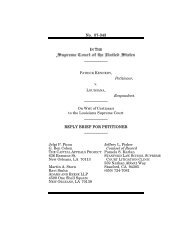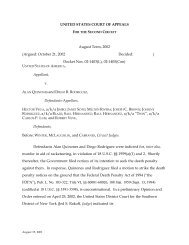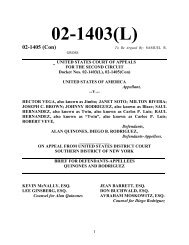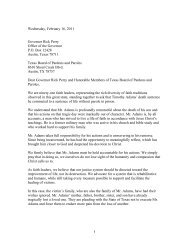Double Tragedies - Families for Human Rights
Double Tragedies - Families for Human Rights
Double Tragedies - Families for Human Rights
- No tags were found...
Create successful ePaper yourself
Turn your PDF publications into a flip-book with our unique Google optimized e-Paper software.
CHARLIE STROBEL’S mother, Mary Catherine Strobel, was abducted and killed inNashville, Tennessee in 1986 by a man who had escaped from a prison mental health ward. Herswas the first of six murders committed be<strong>for</strong>e the man was arrested at the Mexican border threeweeks later. After his arrest, the Strobel family released a statement saying they did not supportthe death penalty. “We knew it could be an issue, and we got out of in front of it,” Charlie explains.“We said we do not want to see this person put to death, it was not in the spirit of the waythat our mother looked at life nor the way that we look at life.”Charlie, a Catholic priest and longtime social justice activist, opposes the death penalty on bothspiritual and political grounds. He remembers testifying against the death penalty be<strong>for</strong>e the Tennesseelegislature in the 1970s, at least a decade be<strong>for</strong>e his mother’s murder. Now that the issue hastouched him personally, he feels an even greater urgency to speak out. He says, “Given that I amnow a family member of a victim, perhaps it falls to me to speak out more so than to someone else.”The man responsible <strong>for</strong> the murders was sentenced to prison <strong>for</strong> three consecutive life terms and died in prison ofnatural causes in 2006.Lois Robison’s question is similar. Her firstborn son,Larry, began exhibiting strange behavior when he was ateenager. By the time he was talking about seeing hallucinationsand hearing voices, Lois and her husband Ken knewsomething was seriously wrong, and they brought him tothe hospital emergency room.The emergency room physician came out [after]about 30 minutes and told us, “Paranoid schizophrenia.”They called our family doctor and hadLarry admitted. They called in a psychiatrist thenext day who talked to us and said it was the worstcase of paranoid schizophrenia he’d ever seen. Thepsychiatrist said, ‘He’s going to need long-termcare. Who’s your insurance with?” I told him, but Isaid that Larry had just turned 21 and wasn’t coveredanymore. When they found that out, theycouldn’t wait to get him out of there.Lois was called in to sit with her son in his hospitalroom while he watched television and thought he wasbeing laughed at, or being sent secret messages, throughthe programs. Eventually a doctor advised her to takeLarry to the county hospital. He spent about threeweeks there, andFinally they called up one day and said they weregoing to discharge him in a few days. I said, “Youcan’t do that,” and they said, “We can’t keep him anylonger. We can only keep him <strong>for</strong> thirty days, becausehe’s not violent.” They kept asking us if he’dever been violent. No, he’s never been violent. Hiswhole life he’s never been violent. So finally Ibegged and I pleaded with everybody. I calleddowntown, you know, to where they commit people.They wouldn’t do anything; they all kept asking,“Is he violent?”Lois finally asked if Larry, having served time in the U.S.Air Force be<strong>for</strong>e his breakdown, could be admitted to a Veteran’sHospital. She took him there, where he again spent afew weeks be<strong>for</strong>e Lois got another, now all-too-familiar callfrom a doctor:He said, “We’re discharging Larry and we’re sendinghim on the bus to [the Robisons’ home town].”I said, “You’re kidding. Discharging him? Is hewell?” “Oh no, he’s not well, and if he doesn’t gethelp he’ll get worse. But we can’t keep him anymorebecause he’s not violent, and we can’t keep himmore than 30 days.” So they sent him home, andabout an hour later I got another call from the samedoctor, and he said, “We made a small mistake. We<strong>for</strong>got to get Larry to sign a release of records.”This small mistake ended up having big consequences.Because they hadn’t gotten Larry to signthe release of records, we couldn’t get medication<strong>for</strong> him at the local Mental Health/Mental Retardationoffice. I asked the doctor what to do, and hesaid, “Take him to MHMR, get him to sign a releaseof records there, they’ll send it to us, and we’ll sendthem his records.” In the meantime, they sent hima two-week supply of medication. But it took sixweeks to get an appointment at MHMR, and bythat time he’d left home. When MHMR called andsaid they could see him now, I said, “Well, he’s lefthome, he’s not here.”While out on his own, Larry tried to rent a truck, anddrove off with one in the rental lot that had keys inside. Hewas charged with auto theft and spent six months in jail,during which time Lois called every agency and group shecould find, trying to hit upon one that would take Larry. Shemanaged to get him into a rehab facility <strong>for</strong> people with drugaddictions, where he spent several months, but his underlyingmental illness still went untreated. “I couldn’t get any-__ 9 __
















